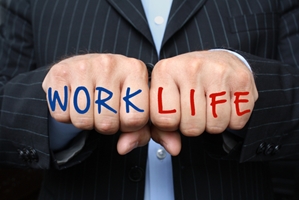
In the employment world, nothing gets done without workers putting their nose to the grindstone, as the old saying goes. But there's something to be said for maintaining a healthy balance of work with personal pursuits. Based on a recent poll of senior executives, this is something many company managers aim to provide for their employees.
Nearly 85 percent of surveyed executives indicated that they encourage their employees to try to effectively balance their home life with the one they have at the office, according to executive staffing and job search firm Battalia Winston.
Workers aren't on their own when it comes to trying to achieve this. A majority of respondents said that they have systems in place that help make this easier. For example, close to three-quarters said they offer flexible work schedules, two-thirds said they permit their employees to telecommute and slightly more than 6 in 10 said they have technological processes that enable staff members to accomplish work tasks from home rather than in the office, such as through teleconferencing or video chat to attend important meetings.
Traditionally, employee benefits are thought of as those that provide workers with health insurance coverage. However, benefits can also come in the form of work-related conveniences, which executives said they try to facilitate through work-life balance initiatives.
Executives 'satisfied' with own work-life balance
In addition to what employers were doing to provide a better work-life balance for their staff members, the poll also asked executives to gauge whether they thought they had achieved it. At 67 percent, more than two-thirds said they were "satisfied" with their work-life balance, even though more than half – 55 percent – said they often work into the evening hours and/or weekends.
"It's the nature of the job and the digital age," said one CEO, referring to working nights or weekends. "Customers and owners expect that we are more connected."
Another CEO commented that there's no real definition of what qualifies as a healthy work-life balance and what doesn't. Much of it depends on people's expectations and how they distinguish between the two.
"Our study confirms that the definition of 'work-life' balance continues to be in flux," said Dale Winston, CEO for the New York City-based talent recruitment firm. "Executives understand that a healthy work-life balance doesn't necessarily mean an eight-hour work day. Leaders are beginning to have a more holistic mindset: sometimes you must tip the scales toward work, sometimes toward family or your personal life."
Executives' focus on their employees overall wellness can go a long way toward helping staff members achieve this delicate balance, which doesn't come easily for many people. In a separate study performed by Randstad, nearly 50 percent said that being in a bad working environment was a top contributor to their work-life imbalance. Roughly 45 percent said poor cooperation among colleagues factored into it and 42 percent pointed to a lack of support in meeting deadlines.





